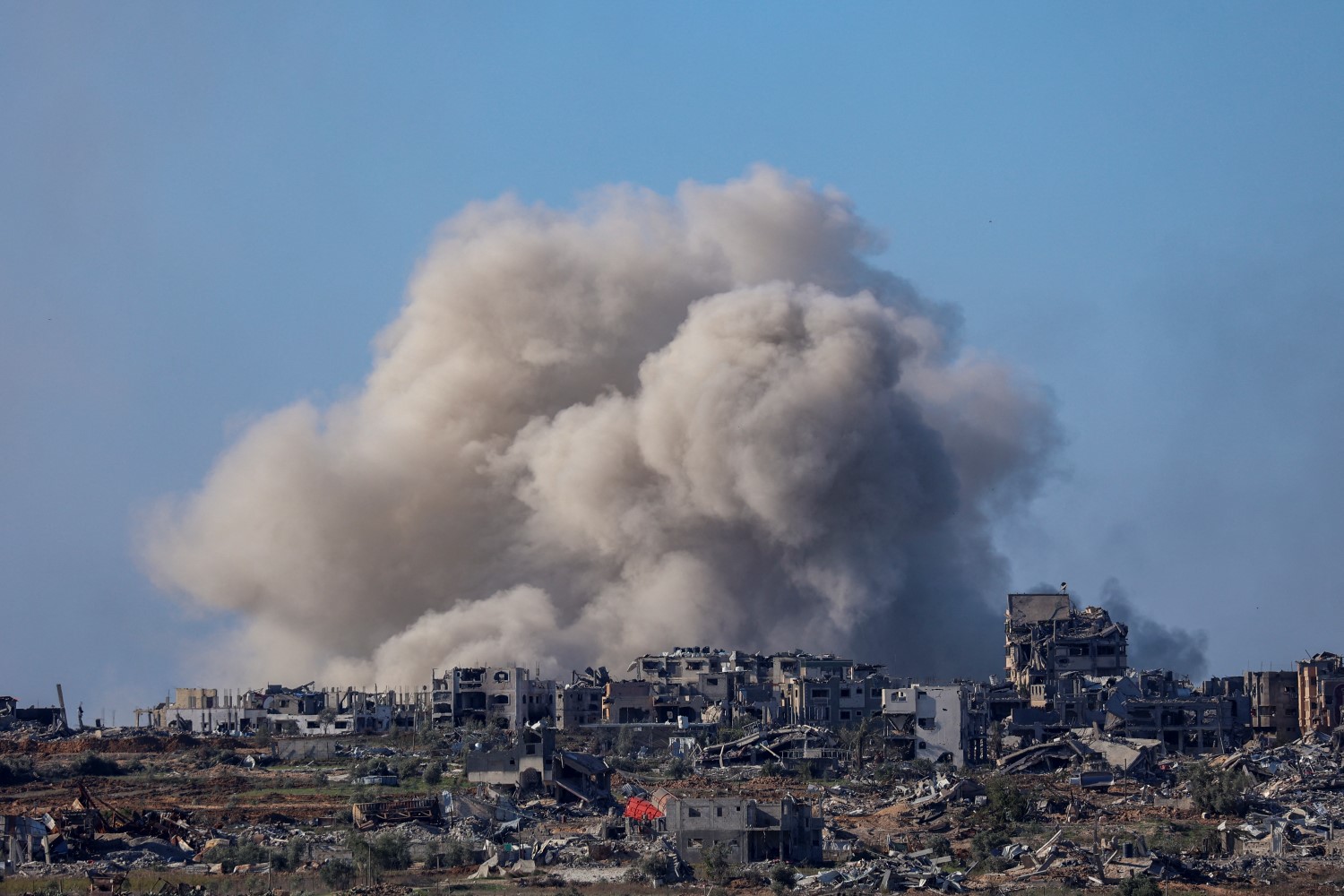Hezbollah said it fired more than 320 rockets from Lebanon, marking the beginning of its retaliation for the killing of its commander.
Hamas has sent a delegation led by senior member Khalil Al-Hayya to Cairo on Saturday for a briefing on the results of the latest negotiations that took place in Egypt, though the talks have yet to yield a breakthrough.
In a statement, top Hamas official Izzat Al-Rishq said the delegation was heading to the Egyptian capital following an invitation from the mediators, Qatar and Egypt.
Al-Rishq reiterated the movement’s commitment to reaching a deal based on what was agreed on July 2, which was based on U.S. President Joe Biden’s proposal and the United Nations Security Council resolution.
“As Hamas confirms its readiness to implement what was agreed upon, it demands pressure on the occupation that would force it to implement this, and to stop obstructing [efforts to] reach an agreement,” Al-Rishq added.
Qatar, Egypt and the United States have been pushing for a deal that would lead to a ceasefire in the Gaza Strip and a captives release amid heightened regional tensions.
A new round of talks took place in Egypt on Saturday following a previous round in Qatar on August 15, which resulted in no breakthrough.
A Palestinian official close to the mediation efforts told Reuters on Saturday that the talks in Cairo “did not make any progress” with Israel insisting to maintain its presence in the Philadelphi Corridor, located between Gaza and Egypt.
A U.S. official privy to the matter told Reuters that the American side met with the Egyptians, then with Egyptians and Qataris on Saturday. The source said they believed that officials from Qatar and Egypt had also met with Hamas.
Biden held separate phone calls ahead of the meetings in Cairo on Friday with Qatar’s Amir Sheikh Tamim bin Hamad Al-Thani and Egyptian President Abdel-Fattah El Sisi.
According to the Amiri Diwan, the call dealt with “developments in the Gaza Strip and the occupied Palestinian territories” as well as joint mediation efforts.
The White House separately said both leaders “discussed the urgency” of reaching a deal on the basis of the “comprehensive bridging proposal” presented during the talks in Doha. The phone call between Biden and Sisi tapped into the same topics.
The bridging proposal on the table was built on one made by Biden on May 31 entailing a three-stage deal, starting with a six-week ceasefire that would enable the release of Palestinian prisoners in exchange for Israeli captives.
While the U.S. had claimed its ally, Israel, accepted the proposal, Hamas said that Israeli Prime Minister has been rejecting Israel’s withdrawal from the Gaza Strip while insisting on occupying the Netzarim corridor, the Egypt-Gaza Rafah Crossing and the Philadelphi Corridor.
The Israeli war has persisted for nearly 11 months amid a prolonged stalemate in the negotiations, with occupation forces carrying out massacres in the besieged enclave.
Since October 7, 2023, Israel has killed at least 40,334 people in the Gaza Strip while displacing more than 1.9 million people out of the 2.1 million population. The war has caused a dire humanitarian catastrophe that became a breeding ground for diseases, including polio.
Hezbollah begins retaliation
Efforts to reach a deal have increased amid heightened regional tensions triggered by Israel’s assassination of Hamas political chief Ismail Haniyeh in Tehran on July 31 and Hezbollah commander Fouad Shukur in Beirut on July 30.
While Israel claimed the attack in Beirut, it has yet to claim responsibility for the killing of Haniyeh despite global condemnations, including from mediators Qatar and Egypt.
Iran and Hezbollah have since vowed to retaliate against Israel for the killings, with the latter launching its first retaliatory attacks on the dawn of Sunday.
According to Al Mayadeen, the attack came shortly after Israeli occupation forces launched a series of airstrikes in southern Lebanon, which lasted for more than 20 minutes.
In a statement, Hezbollah said it fired more than 320 rockets from Lebanon, marking the beginning of its retaliation for the killing of its commander. Sirens were heard across northern Israel as Defence Minister Yoav Gallant declared an emergency situation for the next 48 hours.
Some of the places targeted by Hezbollah included the Meron military base, Neve Ziv barracks, Zatoun military base, Ein Zeitim Base and Ramot Naftali Barracks among other strategic Israeli sites.
“These military operations will take some time to be completed, after that a detailed statement will be issued about their course and objectives[…]The Islamic resistance in Lebanon now and at these moments is at its highest readiness and will stand strong and on the lookout for any Zionist aggression,” Hezbollah said.
Hezbollah Secretary-General Hassan Nasrallah is scheduled to deliver a speech on Sunday at 6:00pm Beirut local time to discuss the first phase of the retaliation.
Meanwhile, the commander in chief of the Islamic Revolution Guards Corps (IRGC), Hossein Salami, reiterated Tehran’s pledge to retaliate against Israel for killing Haniyeh on its soil.
On Saturday, the Islamic Republic News Agency (IRNA) reported that Salami promised “good news” about Iran’s “revenge”.
“You will hear good news about revenge, God willing,” Salami said, as quoted by IRNA.







